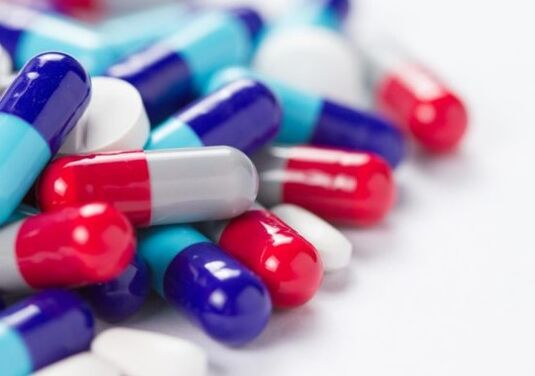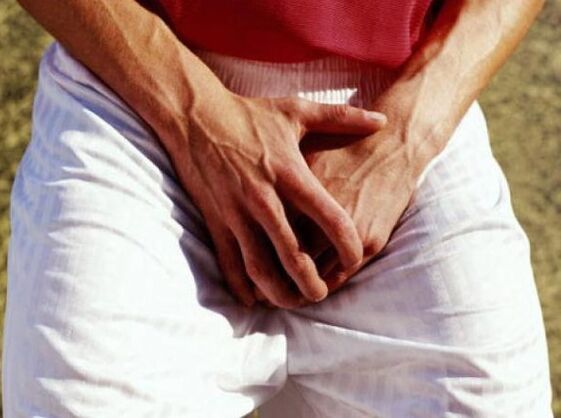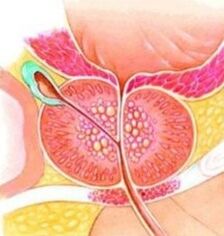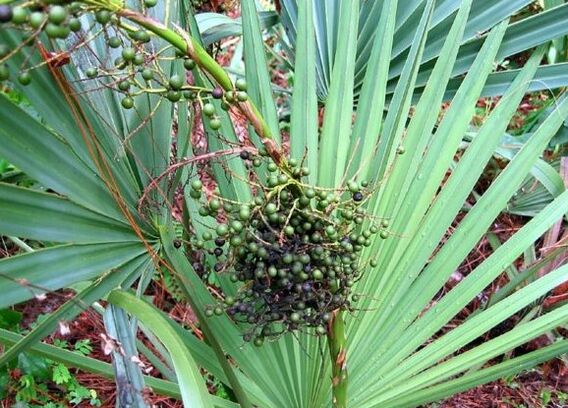Prostatitis is an inflammatory disease of the prostate gland, which develops in the context of exposure to several pathogenic factors at the same time (such as urinary tract infections, a stagnation of the secretor fluid in the seed gallbladder, a violation of the venous output in the glasses of a small pelvis, etc. ). The poleetiological nature of prostatitis determines the need for an integral approach to treatment. The therapy protocols consist, as a rule, of several medications aimed at the eradication of the infectious pathogen (in the case of bacterial inflammation), the relief of the inflammatory process, the normalization of the suction and lymph-pods, as well as the elimination of the residual inflammatory harples for the prevention of repeated recaps.

Pharmacological therapy of prostatitis remains one of the main and most affordable methods of outpatient treatment. At home, a man can use rectal suppositories, tablets, capsules. Rarely ointments and gels are used for inflammatory diseases of the prostate due to the inconvenience of its application. Injections and instillations (the introduction of antiseptics, antibiotics and solutions directly in the prostate part of the urethra) are carried out in the clinic procedure office or in a urological hospital.
Low cost antibiotics (basic therapy)
Antibiotics are medications that can suppress the growth of live microorganisms in fairly low concentrations and cause death. The medications of this group are necessary for the treatment of infectious prostatitis, which represents up to 78% of the total number of men with inflammatory diseases of the prostate. Antibiotic therapy with bacterial prostatitis and prostatatitis (combined inflammation of prostate glands and bladder) has its own characteristics that must be taken into account when selecting an effective treatment regime.
- It is necessary to take antibiotics in any form of infectious prostatitis for at least 4 weeks. This applies even to these medications, whose standard therapy is usually 7 to 10 days.
- The sensitivity of microorganisms, which often cause inflammatory processes in the prostate gland (serotype of Escherichia coli o157/h7, fecal enterococcus, etc. ), to the drugs of the fairly low penicillin row, since these bacteria have a dense capsule membrane. For this reason, the drugs of a group of semi -synthetic penicillins are prescribed for infectious prostatitis only in combination with other antibiotics.
Pay attention!Patients with severe immunosuppression (inhibition of an immune response in the context of interaction with non -specific factors) especially need the correct selection of an adequate dose of antibiotics, which would guarantee a pronounced bactericidal effect. Auto -medical in severe forms of immunodeficiency can not only be ineffective, but also dangerous for health due to a high risk of superinfection.
Economic bactericidal drugs

By using antibiotic therapy, it is important to achieve a bactericidal effect, which consists not only of the suspension of the life of pathogens, but also in their death. For the treatment of prostatitis, especially in the case of a recurring or chronic course, it is advisable to use maximum therapeutic doses with a duration of therapy for at least 28 days (for forms of oral dosing).
Less frequently for the treatment of prostatitis, antispasmodics based on 1%papoverine hydrochloride are used. Papaverine preparations are recommended to use during exacerbation, as well as in chronic pelvic pain syndrome. They are used rectally in the form of suppositories for 1 sail 2 times a day. The recommended treatment course is 10 days.
Corresponds of urodynamics based on the hood of the animal prostate
Execute (extract) prostates is a polypeptide extract that is extracted from the dry tissues of the prostate gland of young government that have arrived sexually mature and ready for insemination (bulls of 7 to 10 months). Preparations based on this extract are indicated only for the treatment of chronic prostatitis (bacterial and asymptomatic congestive, aseptic, chronic) or prostate adenomas in 1-2 stages.
The treatment with medications of this group, which occur in the form of candles, tablets (capsules) and lyophilisate, offers a positive enough stable effect in approximately 31. 3% of the patients, which is considered a fairly high indicator that determines the viability of including the prostate extract in the inflamed treatment scheme of the inflammatory decelerations of the prostate gland. The therapeutic effect of animal preparations is manifested through the following urodynamic improvements:
- Standardization of the secretory activity of the prostate glands;
- Improvement of the output of the secretion of the prostate gland and the elimination of stagnation in the prostate and the pelvic organs;
- Edema reduction;
- Prevention of aggregation (mergers) of platelets and blood clots in the vessels of the gland;
- Elimination of the infiltration of leukocytes to the inflammation approach.

The prostate extract also has a positive effect on metabolism and metabolism in the tissues of the gland, chemical and rheological indicators of prostate secretion.
Extract Sereneaa Drugs Movetur
Serenea Movetur (Palma, Palma Creeping) is a medicinal plant, whose unique properties in the treatment of inflammatory diseases of the genitourinary system in men were first discovered by the ancient Indians. To date, Palma Sabal extract is used by medicine methods not based on evidence as an auxiliary tool for the treatment of inflammatory pathologies of the prostate gland (including DHCH).
According to their pharmacological properties, medications made on the basis of a drag palm extract are related to medications that correct urodynamic indicators and help establish metabolic processes in the prostate gland. Like the funds based on prostate extract, these medications have a fairly high cost, so patients with disabilities should provide all the most affordable medication information in this group.
In hospitals, sabal dry extract can be used in the form of injections and infusions.
Microcirculation concealers
Angio-Transceptors and microcirculation concealers are necessary for stagnant forms of prostatitis, which develop, as a rule, at the bottom of a sedentary lifestyle and hypo-dynamic disorders. The funds of this group have a vasodilatory and angioprotective action, avoid platelet aggregation, improve blood flow and lymphatic fluid in the blood vessels of the microcirculatory channel.

Pay attention!If necessary to carry out diagnostic manipulations that require the use of invasive methods, to cancel medications that delight blood, at least 3 days before the exam.
What other medications are prescribed for the treatment of prostatitis?
The doctor determines the drug combination, whose use will be effective and appropriate in each case. In most cases, the medications of the NSAine group (Diclofenaco, Cetoprofen) are used to stop the inflammatory process. In the recovery stage, the use of carnitine, vitamin and vitamin products is indicated. For abundant washing of the urinary tract in patients with a high risk of ascending infection, diuretics are prescribed. The use of plant rates with diuretic and anti -inflammatory effects is also shown.
During acute inflammation, analgesics and antipyretics are prescribed to eliminate heat and reduce pain. Alpha blockers are prescribed to patients with pronounced urination disorders, accompanied by pain.
What to do with chronic inflammation: Useful tips
In stagnant, bacterial or chronic aseptic prostatitis, it is important not only to take prescribed medications according to the recommended scheme, but also eating properly, as well as adjusting the lifestyle in such a way that eliminating all provocation factors.
- In the diet of men suffering from prostatitis, there must be enough proteins, zinc, selenium, chromium, as well as some vitamins that participate in the secretion of seminal fluid. In the daily menu, it is useful to include shellfish and fish, nuts, seeds, fruits, vegetables, eggs and dairy products.
- To prevent relapse, it is necessary to control the cholesterol level. It is important to monitor the content of the fats in the diet and avoid the frequent and greater use of fatty products.
- Sexual life must be regular. Long -term abstinence contributes to the stagnation of the prostate secret and the development of the congestive inflammation of the prostate. In a healthy man, a period of abstinence of intimacy should not exceed three days.
- Insufficient motor activity is one of the main causes of inflammatory changes in the prostate tissues. In addition to special therapeutic gymnastics, men do morning exercises, walk a lot and regularly visit the pool.

An additional observation after the main stage of the treatment includes the consultation and inspection of the Urologist at least 3-4 times a year, as well as the approval of laboratory diagnoses (urine study, prostate secretion) and ultrasound of the gland and the bladder of the prostate.
Medications are the basis of the basic therapy of prostatitis and other inflammatory diseases of the genitourinary system. The pharmaceutical industry offers a fairly large selection, so it can choose economic and effective medicines with any form and stage of prostatitis. Only the attending physician must carry out any appointment, taking into account the dynamics of the disease and the individual characteristics of the patient. Self -medication, especially medications with antibacterial effects, is unacceptable due to a high risk of superinfection.























